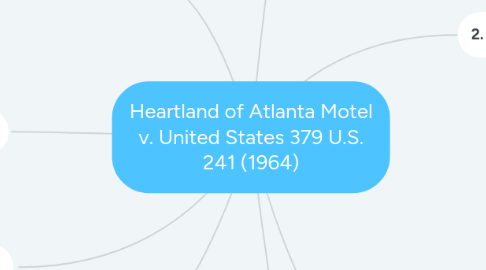
1. 3. Rule of Law
1.1. Congressional authority
1.1.1. Article I, Section 8 of the US Constitution gives Congress the ability to regulate interstate commerce
1.2. The Civil Rights Act of 1875
1.2.1. The Congress passed the law that outlawed such a discrimination that its a crime to deny to anyone the full and equal enjoyment of railways and other transportation.
1.2.1.1. It is required equal treatment in hotels, theaters and other places of public amusement.
2. 4. Analysis/ Application
2.1. The transportation of passengers in interstate commerce is within the regulatory power of Congress, under the commerce clause of the Constitution. The owner of the Heart of Atlanta Motel was located where is was easy accessible to state and interstate highways that the owner accepted convention trade from outside the state.
2.1.1. The power of Congress over interstate commerce is not confined to the regulation of commerce among the states. The case was moved to the Supreme Court.
2.1.1.1. The owner felt that his motel was of a purely local character with no bearing on interstate commerce that his business was not subject to the Civil Right Act of 1964. Also, the owner claimed that the Civil Rights Act of 1964 was unconstitutional. However, about 75% of guests were residents of other states.
2.1.1.1.1. U.S. Supreme Court rules that Civil rights Act is constitutional and upholds decision of district court. Also, the places of public accommodation had no right to select guests or adopt discriminatory practices.
3. 5. Conclusion
3.1. The U.S. Supreme Court rules in favor of the United States, upholding the ruling and injunction filed by the U.S. District Court.
4. 7. Importance
4.1. The Civil Rights Act of 1964 was monumental in establishing precedence and integral to the history of prohibiting racial discrimination in the U.S.
5. 1. Facts
5.1. Parties
5.1.1. Heart of Atlanta Motel
5.1.2. The United States of America Supreme Court
5.2. What happened
5.2.1. The owner of the Heart of Atlanta motel refused to rent rooms to African Americans
5.2.1.1. The Heart of Atlanta Motel claimed that Congress exceeded its constitutional authority by passing the Civil Rights Act.
5.2.2. The owner of Heart of Atlanta Motel argued that his motel was not engaged in interstate commerce but was of a purely local character.
5.2.2.1. However, the motel was located easy accessible to state and interstate highways.
5.2.2.1.1. The owner advertised nationally and accepted convention trade from outside the state
5.2.3. The owner of the Heart of Atlanta motel claims that Congress has overreached its authority under the Commerce Clause in enacting the Civil Rights Act.
5.2.3.1. The district court upheld the Civil Rights Acts as constitutional. The court of appeals affirmed.
5.2.3.1.1. The Heart of Atlanta appealed to the United States Supreme Court and Supreme Court upholds the decision.
5.3. Procedural History
5.3.1. In the 1950s, the U.S. Supreme Court ruled that racial segregation imposed by the states in school system and other public facilities violated the Consititution
5.3.2. The Civil Rights Act of 1964 forbade racial discrimination by places of public accommodation if their operations affected commerce
5.3.3. The Congress may regulate the ability of commercial institution to deny service on the basis of race under its power to regulate interstate commerce.
6. 2. Issue before the Court
6.1. Whether Congress had a rational basis for finding that racial discrimination by motels affected commerce
6.2. Whether the federal government has the power to make private discrimination a crime
6.3. Under the Constitution, can Congress pass a law preventing private businesses from discriminating against people because of their race or color?
7. 6. Impact
7.1. Katzenbach v. McClung, 379 U.S. 294
7.1.1. The court held in 1964 the Civil Rights Act, even for the small local restaurant, called Ollie's Barbeque, where the restaurant's customers were local, it bought much of its supplies through interstate commerce, and that was enough to bring it under the commerce Clause.
7.2. Schechter Poultry Corporation v. United States 295 U.S. 495 (1935)
7.2.1. The President approved the "Live Poultry Code" on April 13th, 1934. The code contains eight articles that describe the scope of purposes, definitions, hours, wages, general labor provisions, administration, trade practice provisions, and general provisions. The code was created as part of the National Industry Recovery Act (NIRA) to regulate industry as a way to combat the great depression.
7.2.2. Schechter's violations included issues relating to its employee's hours and wages and the quality of its poultry products sold to local New York retailers.
7.3. National Labor Relations Board v. Jones and Laughlin Steel Corp. (1937)
7.3.1. Congress passed the National Labor Relations Act (NLRA) in 1935 to enforce federal fair labor practice standard with the right of employees to unionize.
7.3.2. The company, JLSC, fired 10 employees and the employees attempted to unionize at Pennsylvania plants. The NLRA sanctioned the company for engaging in discriminatory employment practices in violation of federal standard.
8. 8. Influence
8.1. The Civil Rights was a method to enforce equal treatment, which was used as very powerful legal tool as to enforce equal treatment.
8.1.1. This case lead fewer and fewer instances of racial discrimination in public accommodations.

